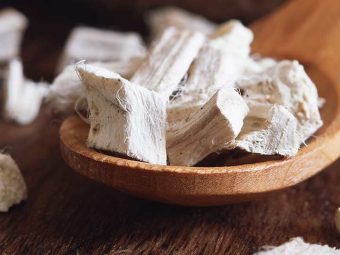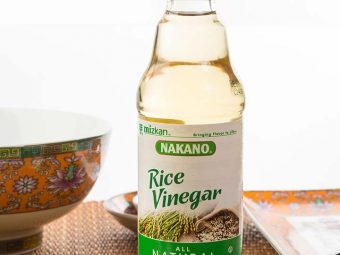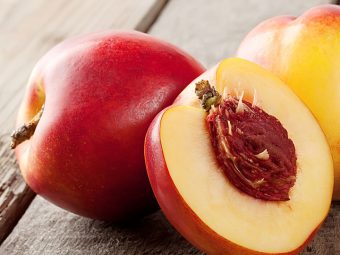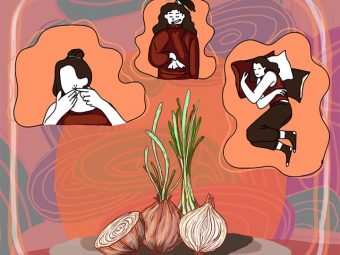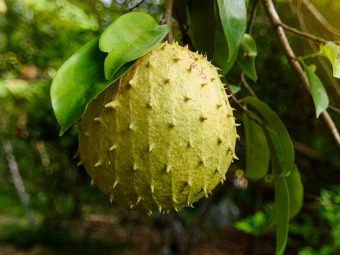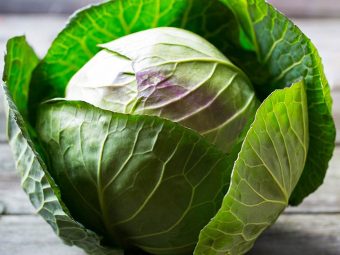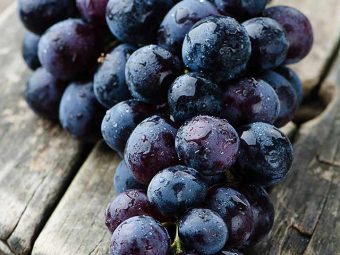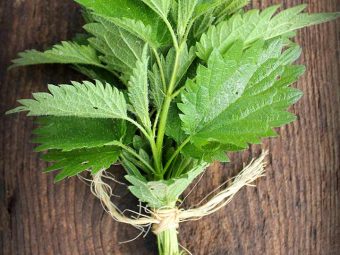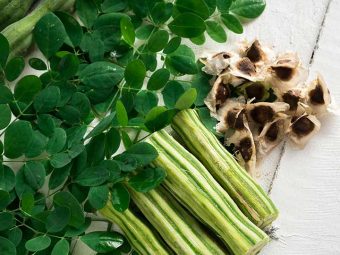9 Health Benefits Of Quercetin, Food Sources, & Side Effects
Include this naturally occuring pigment known for its antioxidant properties in your diet.
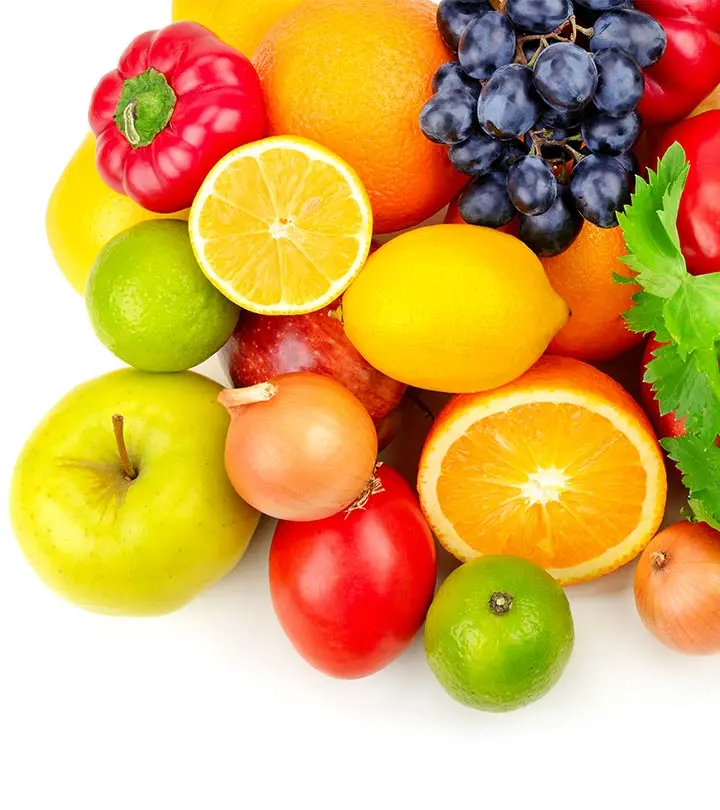
Image: Shutterstock
The benefits of quercetin are attributed to its antioxidant properties. It is found in a variety of fruits and vegetables. This powerful pigment can help protect human health. Quercetin is a type of flavonoid antioxidant that can scavenge free radicals. As a result, it can protect the body against many harmful effects. Research shows that it may protect against various serious health issues, including inflammation and cancer (1).
This article examines the benefits of quercetin, including its sources and possible side effects. Take a look.
In This Article
More On Quercetin
Quercetin is a flavonoid that has biological properties that may promote mental and physical performance. It exhibits anti-inflammatory, anti-carcinogenic, antiviral, antioxidant, and psychostimulant properties (1).
Quercetin happens to the most abundant flavonoid in the human diet (2). Its most important use is as an antioxidant, where it fights free radicals and helps prevent disease.
It has a role to play in the prevention of cardiovascular disease, neurodegenerative issues, cancer, ulcers and other gastric problems, allergies, and microbial ailments (3).
Most of these benefits are backed by extensive research studies conducted all over the world. In the upcoming section, we shall look at them.
What Are The Health Benefits Of Quercetin?
Quercetin can help fight cancer and inflammation. Its ability to fight free radicals also promotes heart health, manages diabetes, and improves vision. The antioxidant also boosts brain health and may delay the signs of aging.
1. May Help Fight Cancer
Quercetin induces apoptosis (cancer cell death) and prevents the proliferation of malignant cells. The compound also may have synergistic effects when combined with chemotherapy (4).
Quercetin inhibits cancers of the breast, lung, prostate, colon, and the cervix. The potent antioxidant properties of quercetin play a role here. They fight free radicals, which are among the major contributors to cancer (5).
A high intake of foods rich in quercetin, including most fruits and vegetables, has been associated with a reduced risk of intestinal cancer. Similar food groups have also been linked to lower incidences of renal cancer (6).
2. May Promote Heart Health
Quercetin was found to lower blood pressure levels (7). This effect was also observed in individuals with type 2 diabetes.
In certain animal studies, quercetin could also lower the levels of triglycerides and total cholesterol (7).
Flavonoids, in general, can reduce the risk of coronary heart disease. They achieve this by promoting the functioning of the blood vessels and reducing platelet activity (resulting in fewer blood clots, which may otherwise lead to stroke) (8).
LDL (the bad cholesterol), when oxidized, can lead to plaque formation in the blood vessels. Quercetin may fight this by preventing the oxidation of LDL (9).
The anti-hypertensive properties of quercetin can also prevent heart damage, as per reports. This effect was observed to be far greater in smokers and those with metabolic syndrome (10).
3. May Aid Diabetes Treatment
Treatment with quercetin and resveratrol can have beneficial effects on diabetes. The antioxidant helps lower plasma glucose levels and improves other parameters related to diabetes. It achieves this by restoring the glucose-regulating enzymes in the liver (11).
Other studies have also called quercetin as a promising component in managing the symptoms of type 2 diabetes. The antioxidant activates multiple therapeutic agents in the body, thereby aiding the treatment of type 2 diabetes (12).
Dietary quercetin was also found to improve the health of the pancreas and the liver. This may help ameliorate diabetes symptoms since those are the two important organs responsible for preventing the disease (13).
Quercetin was also found to treat liver inflammation. It has been identified as a novel compound in the treatment of fibrotic liver disease (14).
Quercetin may also protect the liver from injury. It achieves this by scavenging free radicals and combating oxidative stress (15).
4. May Fight Inflammation
Quercetin inhibits the secretion and production of pro-inflammatory cytokines, which are compounds that promote inflammation in the human body. It may also protect the body’s cells involved in allergic inflammation (16).
In studies conducted on healthy subjects, quercetin supplementation had improved various markers of inflammation (17).
Quercetin also has a role to play in the treatment of rheumatoid arthritis. It preserves the basement membranes of the cartilage and even prevents its damage (18).
5. May Cut Obesity Risk
There is limited evidence here. A supplement with quercetin as the primary ingredient caused reduced lipid accumulation in obese rats (19).
Quercetin also can increase energy expenditure, and this may help reduce the risk of obesity (20). However, further research is warranted.
6. May Enhance Vision Health
Quercetin was found to treat corneal inflammation, thus promoting long-term vision health. When human conjunctival and corneal cell lines were tested, the antioxidant and anti-inflammatory effects of the compound seemed to help with the treatment of a few ocular diseases (21). However, more studies are required to establish its efficacy.
In mice studies, quercetin could also help treat dry eyes (21).
Quercetin may also reduce the risk of cataracts. It achieves this by fighting oxidative stress (22).
7. May Promote Kidney Health
In a rat study, quercetin improved renal function and protected the kidneys from further harm. Its ability to fight oxidative stress and inflammation could be attributed to this benefit (23).
In another study, quercetin ameliorated renal damage and the corresponding oxidative stress (24).
8. May Boost Brain Health
Quercetin fights oxidative stress and mitochondrial dysfunction, thereby helping prevent brain diseases like Alzheimer’s and Parkinson’s (25). More research is needed to arrive at a conclusion.
In a study, quercetin was found to prevent spatial memory impairment in mice. It achieves this by increasing brain antioxidant capacity (26). This way, the flavonoid may potentially slow down brain aging.
Reports also suggest that apples, which are rich in quercetin, can help prevent brain damage that may otherwise trigger Alzheimer’s and Parkinson’s (27).
Quercetin can also help treat stress and anxiety. Individuals dealing with chronic stress may experience improvements in memory following the intake of quercetin (28).
9. May Improve Exercise Endurance
Studies show that quercetin may improve endurance exercise capacity and exercise performance, though the improvements are trivial (29).
In another study involving male badminton players, quercetin was found to improve endurance exercise performance (30).
10. May Help Fight Infections And Pain
The antibacterial properties of quercetin may help fight infections. The compound was found to be especially effective against Staphylococcus aureus. In combination with other antibiotics, quercetin showed enhanced antibacterial activity (31).
Quercetin may also help treat allergies. It fights viruses by stimulating the immune system. It is also efficient in suppressing inflammatory mediators (32).
Quercetin may have a role to play in asthma treatment as well. It may help treat the condition by relaxing the airway smooth muscles. The anti-inflammatory properties of quercetin may also aid asthma treatment (33).
Quercetin also acts as a natural antihistamine (histamine is a compound released during inflammation or an allergic reaction). This way, it aids the treatment of other respiratory infections, like bronchitis (34).
The flavonoid may also have a role to play in relieving pain. It achieves this by inhibiting oxidative stress and the production of cytokines (compounds that contribute to inflammation) (35). Studies shed light on quercetin’s possible role in treating chronic pelvic pain syndrome (36).
11. May Promote Sexual Function
Flavonoids, in general, could be associated with improved sexual function (37).
Quercetin may also help treat erectile dysfunction as it helps combat oxidative stress (a common cause of the issue) (38).
12. May Help Treat Leaky Gut
Leaky gut, also known as intestinal permeability, is a condition in which the lining of the small intestine becomes damaged. This causes the toxic wastes in the small intestine to leak into the bloodstream, causing issues.
Studies show that quercetin boosts the intestinal barrier function, which may help in treating leaky gut (39). However, more research is warranted in this regard.
Quercetin may also have other gastroprotective effects. The compound can increase gastric mucus production, thereby aiding the treatment of ulcers (40).
13. May Help Delay Aging
Quercetin has been found to extend cellular lifespan and survival, thereby possibly delaying the signs of aging. It was also found to rejuvenate fibroblasts (41).
Quercetin also happens to be one of the popular ingredients in most anti-aging skin care creams (42).
When we talk about antioxidants, quercetin tops the list, for sure. Most of the benefits we have discussed have been confirmed by research studies. Further research is ongoing.
Quercetin is among the common antioxidants available in the human diet. In the following section, we will look at the top food sources of the flavonoid.
References
Articles on StyleCraze are backed by verified information from peer-reviewed and academic research papers, reputed organizations, research institutions, and medical associations to ensure accuracy and relevance. Read our editorial policy to learn more.
The top food sources of quercetin include the following (43):
- Apples
- Grapes
- Licorice
- Oregano
- Capers
- Onions
- Peppers
- Tomatoes
- Cherries
- Asparagus
- Green tea
In addition to these, quercetin supplements are on the rise. They could be a way of supplementing your diet with adequate quercetin. But how effective can they be?
A Note On Quercetin Supplements
Though quercetin is commonly present in most everyday foods, its levels could be low. Isolated quercetin is used and marketed as a dietary supplement and may help promote health benefits. Adverse effects following the intake of quercetin supplements are rare, and any such effects were only mild (44).
The safety of the use of high supplemental doses of quercetin (>1000 mg per day) is not available (44). Hence, we suggest you consult with your doctor on the usage.
The typical dosage of quercetin could be between 500 to 1000 mg per day (45).
Does Quercetin Pose Any Side Effects?
Though most often quercetin supplements may not cause any adverse effects, they may lead to certain mild issues. These can include stomach ache or headaches as per anecdotal evidence.
There is some research that states that excess intake of quercetin may have carcinogenic effects (8). There is limited information on the ideal dosage of quercetin. Hence, if you are to take quercetin supplements, please check with your health care provider.
Quercetin’s benefits are numerous. These can be attributed to its antioxidants. It reduces cancer risk, promotes heart health, aids in diabetes management, cuts down the risk of obesity, and improves vision, kidney, and bone health. It also helps in fighting pain and infections and improves exercise endurance. Including foods rich in quercetin in your diet can help you with the ideal dosage. You can also try quercetin supplements if prescribed. However, do not overdose on it as it may trigger negative effects like stomach and head aches.
Frequently Asked Questions
Does quercetin affect the thyroid gland?
Some research states that quercetin may restrict thyroid function (46). Hence, if you have thyroid issues, please check with your health care provider before taking quercetin supplements.
References
Articles on StyleCraze are backed by verified information from peer-reviewed and academic research papers, reputed organizations, research institutions, and medical associations to ensure accuracy and relevance. Read our editorial policy to learn more.
- Quercetin, Inflammation and Immunity, Nutrients, US National Library of Medicine, National Institutes of Health.
https://www.ncbi.nlm.nih.gov/pmc/articles/PMC4808895/ - Quercetin: potentials in the prevention and therapy of disease, Current Opinion in Clinical Nutrition and Metabolic Care, US National Library of Medicine, National Institutes of Health.
https://www.ncbi.nlm.nih.gov/pubmed/18827577 - Overviews of Biological Importance of Quercetin: A Bioactive Flavonoid, Pharmacognosy Review, US National Library of Medicine, National Institutes of Health.
https://www.ncbi.nlm.nih.gov/pmc/articles/PMC5214562/ - Quercetin in Cancer Treatment, Alone or in Combination with Conventional Therapeutics?, Current Medicinal Chemistry, US National Library of Medicine, National Institutes of Health.
https://www.ncbi.nlm.nih.gov/pubmed/26264923 - Effects of low dose quercetin: Cancer cell-specific inhibition of cell cycle progression, Journal of Cellular Biochemistry, US National Library of Medicine, National Institutes of Health.
https://www.ncbi.nlm.nih.gov/pmc/articles/PMC2736626/ - Quercetin and Cancer Chemoprevention, Evidence-based Complementary and Alternative Medicine, US National Library of Medicine, National Institutes of Health.
https://www.ncbi.nlm.nih.gov/pmc/articles/PMC3136711/ - Does Quercetin Improve Cardiovascular Risk factors and Inflammatory Biomarkers in Women with Type 2 Diabetes: A Double-blind Randomized Controlled Clinical Trial, International Journal of Preventive Medicine, US National Library of Medicine, National Institutes of Health.
https://www.ncbi.nlm.nih.gov/pmc/articles/PMC3775217/ - Dietary flavonoid intake and cardiovascular risk: a population-based cohort study
https://translational-medicine.biomedcentral.com/articles/10.1186/s12967-015-0573-2 - Role of quercetin in cardiovascular diseases, Internet Journal of Medical Update, CiteSeerX.
http://citeseerx.ist.psu.edu/viewdoc/download?doi=10.1.1.705.9127&rep=rep1&type=pdf - Effects of Quercetin on Blood Pressure: A Systematic Review and Meta-Analysis of Randomized Controlled Trials, Touro College and University System, NYMC Faculty Publications.
https://touroscholar.touro.edu/cgi/viewcontent.cgi?referer=https://www.google.com/&httpsredir=1&article=1102&context=nymc_fac_pubs - Anti-Diabetic Effect of Cotreatment with Quercetin and Resveratrol in Streptozotocin-Induced Diabetic Rats, Biomolecules & Therapeutics, US National Library of Medicine, National Institutes of Health.
https://www.ncbi.nlm.nih.gov/pmc/articles/PMC5839491/ - Quercetin, a Lead Compound against Type 2 Diabetes Ameliorates Glucose Uptake via AMPK Pathway in Skeletal Muscle Cell Line, Frontiers in Pharmacology, US National Library of Medicine, National Institutes of Health.
https://www.ncbi.nlm.nih.gov/pmc/articles/PMC5462925/ - Dietary quercetin alleviates diabetic symptoms and reduces streptozotocin-induced disturbance of hepatic gene expression in mice, United States Department of Agriculture.
https://pubag.nal.usda.gov/catalog/440555 - The Flavonoid Quercetin Ameliorates Liver Inflammation and Fibrosis by Regulating Hepatic Macrophages Activation and Polarization in Mice, Frontiers in Pharmacology, US National Library of Medicine, National Institutes of Health.
https://www.ncbi.nlm.nih.gov/pmc/articles/PMC5819566/ - Protective effects of quercetin on liver injury induced by ethanol, Pharmacognosy Magazine, US National Library of Medicine, National Institutes of Health.
https://www.ncbi.nlm.nih.gov/pmc/articles/PMC2900062/ - Therapeutic Effects of Quercetin on Inflammation, Obesity, and Type 2 Diabetes, Mediators of Inflammation, US National Library of Medicine, National Institutes of Health.
https://www.ncbi.nlm.nih.gov/pmc/articles/PMC5149671/ - The effect of quercetin supplementation on selected markers of inflammation and oxidative stress, Journal of Research in Medical Sciences, US National Library of Medicine, National Institutes of Health.
https://www.ncbi.nlm.nih.gov/pmc/articles/PMC3685779/ - Quercetin: A Potential Natural Drug for Adjuvant Treatment of Rheumatoid Arthritis, African Journal of Traditional, Complementary, and Alternative Medicines, US National Library of Medicine, National Institutes of Health.
https://www.ncbi.nlm.nih.gov/pmc/articles/PMC3777580/ - Antiobesity Efficacy of Quercetin-Rich Supplement on Diet-Induced Obese Rats: Effects on Body Composition, Serum Lipid Profile, and Gene Expression, Journal of Agriculture and Food Chemistry, US National Library of Medicine, National Institutes of Health.
https://www.ncbi.nlm.nih.gov/pubmed/29249156 - Quercetin transiently increases energy expenditure but persistently decreases circulating markers of inflammation in C57BL/6J mice fed a high-fat diet, Rutgers, The State University of New Jersey.
https://rucore.libraries.rutgers.edu/rutgers-lib/24172/PDF/1/play/ - Quercetin and the ocular surface: What we know and where we are going, Experimental Biology and Medicine, US National Library of Medicine, National Institutes of Health.
https://www.ncbi.nlm.nih.gov/pmc/articles/PMC5685256/ - Eye lens in aging and diabetes: effect of quercetin, Rejuvenation Research, US National Library of Medicine, National Institutes of Health.
https://www.ncbi.nlm.nih.gov/pubmed/21978083 - Quercetin Treatment Improves Renal Function and Protects the Kidney in a Rat Model of Adenine-Induced Chronic Kidney Disease, Medical Science, US National Library of Medicine, National Institutes of Health.
https://www.ncbi.nlm.nih.gov/pmc/articles/PMC6069490/ - Flavonoids in Kidney Health and Disease, Frontiers in Physiology, US National Library of Medicine, National Institutes of Health.
https://www.ncbi.nlm.nih.gov/pmc/articles/PMC5928447/ - Role of Quercetin Benefits in Neurodegeneration, Advances in Neurobiology, US National Library of Medicine, National Institutes of Health.
https://www.ncbi.nlm.nih.gov/pubmed/27651256 - Quercetin attenuates spontaneous behavior and spatial memory impairment in D-galactose-treated mice by increasing brain antioxidant capacity, United States Department of Agriculture.
https://pubag.nal.usda.gov/catalog/704565 - An apple a day could help protect against brain-cell damage that triggers Alzheimer’s, Parkinsonism, Cornell studies find, Cornell University.
https://news.cornell.edu/stories/2004/11/apple-day-could-protect-against-brain-cell-damage - Quercetin protects against stress-induced anxiety- and depression-like behavior and improves memory in male mice, Physiological Research, US National Library of Medicine, National Institutes of Health.
https://www.ncbi.nlm.nih.gov/pubmed/30044120 - Quercetin and endurance exercise capacity: a systematic review and meta-analysis, Medicine and Science in Sports and Exercise, US National Library of Medicine, National Institutes of Health.
https://www.ncbi.nlm.nih.gov/pubmed/21606866 - Effect of Eight Weeks of Quercetin Supplementation on Exercise Performance, Muscle Damage and Body Muscle in Male Badminton Players, International Journal of Preventive Medicine, US National Library of Medicine, National Institutes of Health.
https://www.ncbi.nlm.nih.gov/pmc/articles/PMC3665027/ - Characterisation of anti-Staphylococcus aureus activity of quercetin, United States Department of Agriculture.
https://pubag.nal.usda.gov/catalog/2264056 - Quercetin and Its Anti-Allergic Immune Response, Molecules, US National Library of Medicine, National Institutes of Health.
https://www.ncbi.nlm.nih.gov/pubmed/27187333 - Quercetin acutely relaxes airway smooth muscle and potentiates β-agonist-induced relaxation via dual phosphodiesterase inhibition of PLCβ and PDE4, American Journal of Physiology, Lung Cellular and Molecular Physiology, US National Library of Medicine, National Institutes of Health.
https://www.ncbi.nlm.nih.gov/pmc/articles/PMC3763034/ - Overviews of Biological Importance of Quercetin: A Bioactive Flavonoid, Pharmacognosy Review, US National Library of Medicine, National Institutes of Health.
https://www.ncbi.nlm.nih.gov/pmc/articles/PMC5214562/ - Quercetin reduces inflammatory pain: inhibition of oxidative stress and cytokine production, Journal of Natural Products, US National Library of Medicine, National Institutes of Health.
https://www.ncbi.nlm.nih.gov/pubmed/19899776 - Quercetin for chronic prostatitis/chronic pelvic pain syndrome, The Urologic Clinics of North America, US National Library of Medicine, National Institutes of Health.
https://www.ncbi.nlm.nih.gov/pubmed/21798389 - Flavonoids associated with better erectile function, Harvard Medical School.
https://www.health.harvard.edu/mens-health/in-the-journals-flavonoids-associated-with-better-erectile-function - Effects of quercetin on intracavernous pressure and expression of nitrogen synthase isoforms in arterial erectile dysfunction rat model, International Journal of Clinical and Experimental Medicine, US National Library of Medicine, National Institutes of Health.
https://www.ncbi.nlm.nih.gov/pmc/articles/PMC4509250/ - Quercetin enhances intestinal barrier function through the assembly of zonula [corrected] occludens-2, occludin, and claudin-1 and the expression of claudin-4 in Caco-2 cells, The Journal of Nutrition, US National Library of Medicine, National Institutes of Health.
https://www.ncbi.nlm.nih.gov/pubmed/19297429 - Antiulcer and gastroprotective effects of quercetin: a gross and histologic study, Pharmacology, US National Library of Medicine, National Institutes of Health.
https://www.ncbi.nlm.nih.gov/pubmed/8309988 - Anti-ageing and rejuvenating effects of quercetin, Experimental Gerontology, US National Library of Medicine, National Institutes of Health.
https://www.ncbi.nlm.nih.gov/pubmed/20619334 - Phytochemicals and anti-aging potentials of the extracts from Lagerstroemia speciosa and Lagerstroemia floribunda, United States Department of Agriculture.
https://pubag.nal.usda.gov/catalog/5825164 - USDA Database for the Flavonoid Content of Selected Foods, United States Department of Agriculture.
https://www.ars.usda.gov/ARSUserFiles/80400525/Data/Flav/Flav_R03.pdf - Safety Aspects of the Use of Quercetin as a Dietary Supplement, Molecular Nutrition & Food Research, US National Library of Medicine, National Institutes of Health.
https://www.ncbi.nlm.nih.gov/pubmed/29127724 - The variable plasma quercetin response to 12-week quercetin supplementation in humans, European Journal of Clinical Nutrition, US National Library of Medicine, National Institutes of Health.
https://www.ncbi.nlm.nih.gov/pubmed/20517329 - The flavonoid quercetin inhibits thyroid-restricted genes expression and thyroid function, Food and Chemical Toxicology, US National Library of Medicine, National Institutes of Health.
https://www.ncbi.nlm.nih.gov/pubmed/24447974






